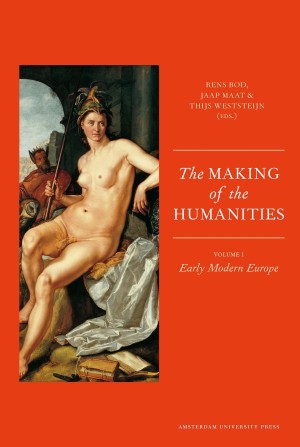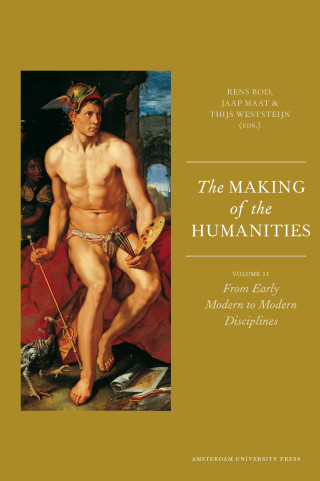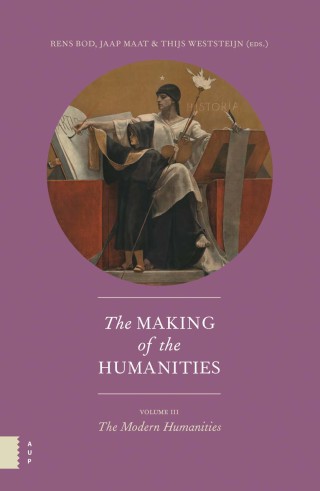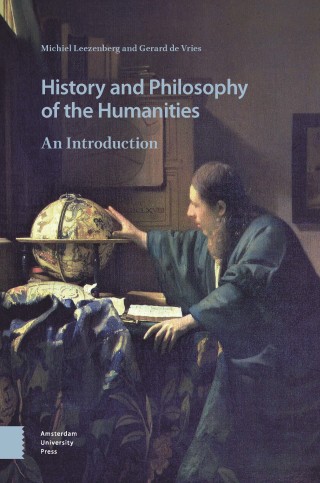
The Making of the Humanities
Volume 1 - Early Modern Europe
Zoals blijkt uit een beruchte opmerking van Ronald Plasterk dat ‘alfa’s de geschiedenis schrijven, en beta’s de geschiedenis maken’, is de invloed van de alfawetenschappen lange tijd onderschat. Dit boek is een eerste stap tot een overzichtsgeschiedenis van de humaniora. Specialisten uit verschillende vakgebieden bieden een vergelijkende geschiedenis van de taalkunde, filologie, muziekwetenschap, historische wetenschappen, logica en literatuurwetenschap.
Dit eerste deel uit de serie The Making of the Humanities richt zich op de vroegmoderne tijd. Verschillende perspectieven maken duidelijk hoe de geesteswetenschappen zich ontwikkelden van ‘vrije kunsten’ tot moderne disciplines. Nieuw licht valt op de rol van de humaniora in de Wetenschappelijke Revolutie.
Gerenommeerde auteurs uit Europa en Amerika, onder wie Floris Cohen, David Cram en Ingrid Rowland, bieden nieuwe inzichten voor zowel specialisten als geïnteresseerde leken, studenten en alfawetenschappers in de breedste zin van het woord.
Dit eerste deel uit de serie The Making of the Humanities richt zich op de vroegmoderne tijd. Verschillende perspectieven maken duidelijk hoe de geesteswetenschappen zich ontwikkelden van ‘vrije kunsten’ tot moderne disciplines. Nieuw licht valt op de rol van de humaniora in de Wetenschappelijke Revolutie.
Gerenommeerde auteurs uit Europa en Amerika, onder wie Floris Cohen, David Cram en Ingrid Rowland, bieden nieuwe inzichten voor zowel specialisten als geïnteresseerde leken, studenten en alfawetenschappers in de breedste zin van het woord.
Redacteuren
Thijs Weststeijn
Thijs Weststeijn is a researcher and lecturer at the department of Art History of the University of Amsterdam.
- Titel
- The Making of the Humanities
- Subtitel
- Volume 1 - Early Modern Europe
- Redacteuren
- Rens Bod
- Jaap Maat
- Thijs Weststeijn
- Prijs
- € 78,95 excl. BTW
- ISBN
- 9789089642691
- Uitvoering
- Paperback
- Aantal pagina's
- 400
- Taal
- Engels
- Publicatiedatum
- 15 - 10 - 2010
- Afmetingen
- 16 x 24 cm
- Open access
- Download op Open Access Platform
- Discipline
- History, Art History, and Archaeology
Table of Contents - 6
Introduction: Historiography of the Humanities
- 8
I. The Humanities versus the Sciences
- 16
How Comparative Should a Comparative History of the Humanities Be?
- 18
Bridging the Gap - 40
Music as Science and as Art
- 60
II. The Visual Arts as Liberal Arts
- 74
Representing the World
- 76
Ficino, Diacceto and Michelangelo’s
- 108
‘Signs that Signify by Themselves’
- 134
III. Humanism and Heresy
- 162
Giordano Bruno and Metaphor
- 164
‘In Erudition There Is No Heresy’
- 178
IV. Language and Poetics - 198
Humanism in the Classroom, a Reassessment
- 200
Origins and Principles
- 232
Transitional Texts and Emerging Linguistic Self-Awareness
- 250
V. Linguists and Logicians
- 262
The Changing Relations between Grammar, Rhetoric and Music in the Early Modern Period
- 264
The Artes Sermocinales in Times of Adversity
- 284
VI. Philology and Philosophy
- 298
Manuscript Hunting and the Challenge of Textual Variance in Late Seventeenth-Century Icelandic Studies
- 300
Spinoza in the History of Biblical Scholarship
- 314
The ‘Rules of Critique’
- 328
VII. The History of History
- 350
Framing a New Mode of Historical
Experience - 352
Philosophy’s Shadow
- 368
Contributors
- 386
List of Figures - 392
Index - 396
Recensies en Artikelen
Anja-Silvia Goeing, in Renaissance Quarterly, Vol. 65, No. 3 (Fall 2012):
'The strength of this book lies in the way it connects = well-known profiles to lesser-known figures, and in its discussion of those fields, including the visual arts, linguistics, and history, that had scarcely been defined among the artes liberales in the humanism of the fifteenth and sixteenth centuries. As this book shows, the significance of these disciplines for the academy grew immensely in the seventeenth and eighteenth centuries. The chapters examine the history of disciplines that today are regarded as separate and distinct. = The purpose of this book is to answer two questions: first, the question of what - what kind of organizing principles did academic knowledge deploy in different early modern settings?; and second, the question of how - how did academic knowledge in Europe come to be what it is in modern times? The authors' focus on the non-sciences is intended to fill a lack that the editors see when compared to the vast and existing literature written about the history of the sciences. The book is therefore most valuable to academics studying the history of European academic knowledge.'
Gerelateerde boeken

The Making of the Humanities
Rens Bod, Jaap Maat, Thijs Weststeijn (red.)

The Making of the Humanities, Volume III
Rens Bod, Jaap Maat, Thijs Weststeijn (red.)

History and Philosophy of the Humanities
Michiel Leezenberg, Gerard de Vries

Future Practices of Citizenship in Asia and the West
Gregory Bracken, Paul Rabé, Nurul Azreen Azlan (red.)
